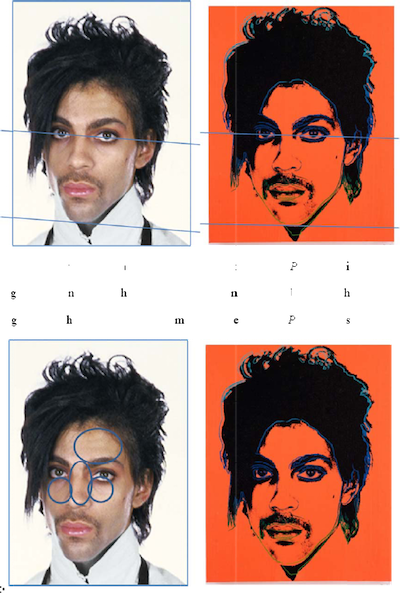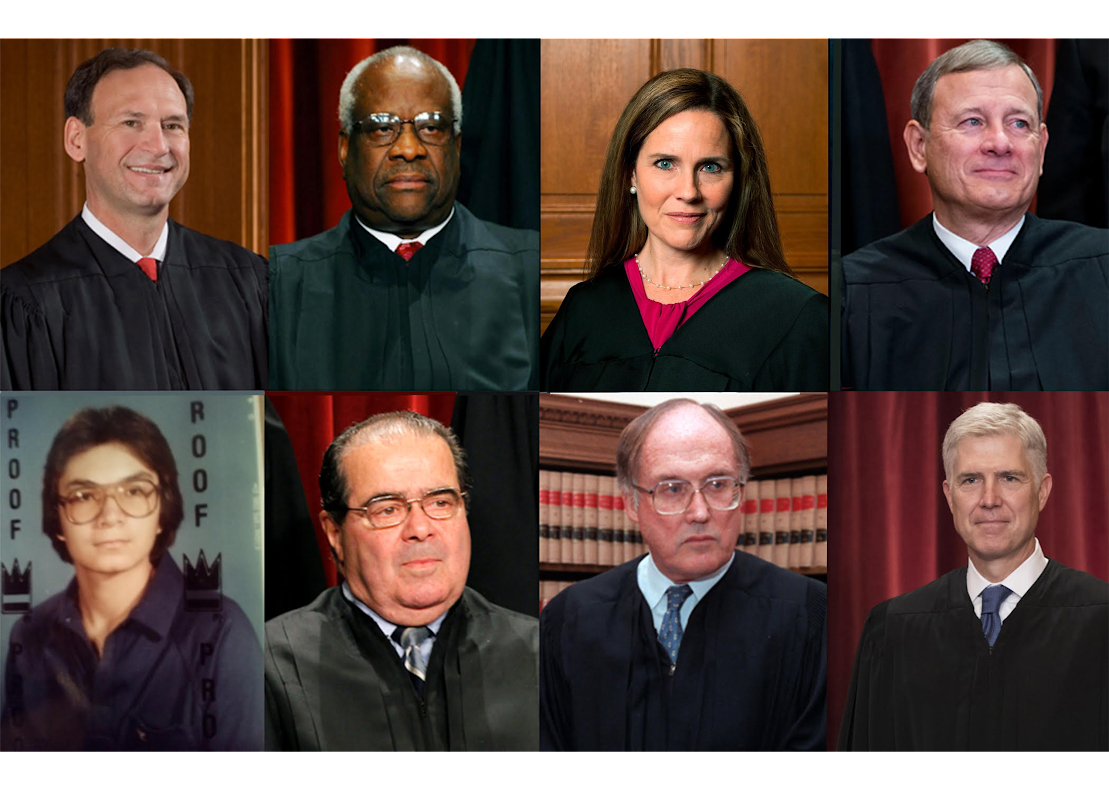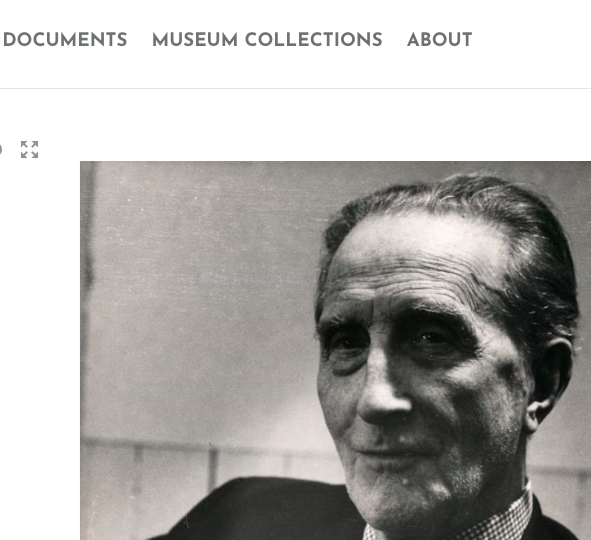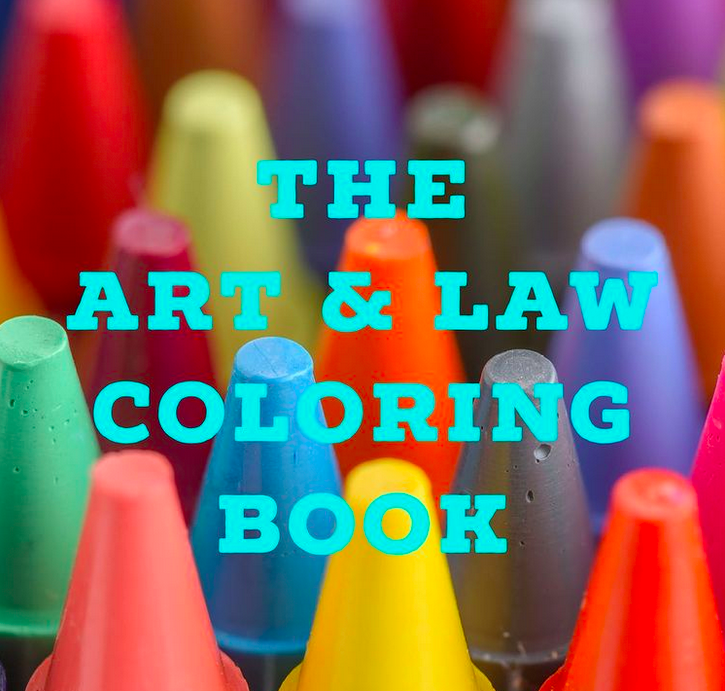Kelly Denato, of Brooklyn, is suing a New York-based animated cartoon studio, alleging she’s been denied royalties she’s entitled to for designing a character that became the namesake of a Cartoon Network show, Ellen’s Acres. She says in the suit that she was due 25% of all revenues stemming from book sales, merchandising and animated motion pictures like television shows. The suit seeks damages in excess of $1 million.
Will textualism save our copyright planet? Warhol Fdn v. Lynn Goldsmith headed to SCOTUS
Images of Goldsmith and Warhol at issue. The U.S. Supreme Court will review a ruling that an Andy Warhol print infringed a copyrighted photograph taken by photographer, Lynn Goldsmith, of the late musician, Prince. We certainly hope--as much as one can hope for anything these days--that SCOTUS cleans up the wasteland that has become of "fair use" interpretation. One would think, and hope I suppose, that with many of the sitting justices adhering to textualism, they will fully jettison the nonsensical "transformativeness" test that has plagued us like a really bad case of Covid since the mid-1990s. Docs here, via ...


Podcast: Stephanie Drawdy and Sergio Munoz Sarmiento on All Things Art and Law
Ahh...Youth! Sergio Munoz Sarmiento. (2015 - ongoing), C-Print. © and TM Sergio Muñoz Sarmiento. All rights reserved. I had a lovely conversation with fellow lawyer and artist, Stephanie Drawdy, on the NFT craze, pets, art law, and the origins of The Art & Law Program. You can listen to the Podcast here. Hope you enjoy!


Marcel Duchamp archives now online, free of charge
The Philadelphia Museum of Art, the Centre Pompidou, and the Association Marcel Duchamp have digitized their vast archives of material on the Dadaist and placed it online, where it is free to all. Enjoy!


The Art & Law Coloring Book
If you have kids at home and want them to do something fun and educational, try the Art & Law Coloring Book, an ongoing project by The Art & Law Program. Really a great collection of drawings by great artists, including: Emma Jane Bloomfield Damien Davis Molly Dilworth João Enxuto Soda Jerk Clare Kambhu Alexandra Lerman Erica Love Douglas Melini Sergio Muñoz Sarmiento Melinda Shades Elisabeth Smolarz Gabriel Sosa Alfred Steiner Valerie Suter Happy coloring!


What are NFTs and what does it mean to own one?
If you're confused as to what the hell NFTs are, particularly art NFTs, here's a new article by Alfred Steiner that pretty much walks you through and safely out of the NFT hell. In his article, Steiner explains what NFTs are and what it means to own one. He also discusses why that meaning of ownership—which may appear novel to many—isn’t new at all when considered against the backdrop of the market for conceptual art. Steiner concludes with some observations about how NFTs may be good and bad for the art industry.


Of notable interest. The LA Times’ Culture Monster did a quick search of YouTube to see which artists and works of art have succeeded in evading YouTube’s nudity standards policy. According to the Monster,
YouTube, which is owned by Google, officially forbids users from posting videos to its site that feature sexually explicit content. It also forbids “most” nudity — that is to say, “if a video is intended to be sexually provocative, it is less likely to be acceptable for YouTube,” according to the company’s rules. “There are exceptions for some educational, documentary and scientific content, but only if that is the sole purpose of the video and it is not gratuitously graphic.”
Check out Culture Monster’s other findings here, with hyperlinks to videos with nudity!
If you’re interested in artists’ rights, this is right up your alley and in time for good summer reading.
The Journal of Biocommunication, a journal dedicated to serving as a showcase of proven and experimental procedures in medical art and illustration, print, photography, film, television, computer, multimedia systems, and other communication modalities applied in the health sciences, has a remarkably interesting and timely special issue that focuses on aspects of artists’ rights, including articles that discuss more recent issues surrounding existing copyright law, copyright registration, artists’ rights, and the current U.S. Orphan Works legislation.
This issue features five outstanding articles beginning with Terrence Brown’s “Historic Rights Issues in American Illustration.” Mr. Brown traces the development of American illustration during the post Civil War period, as book, newspaper, and magazine publishers successfully used artists’ sketches and illustrations to accompany their printed text and advertisements. These artists became more and more important to the publisher’s success, and the demand for their illustrations grew. Ownership of original art and issues relating to secondary usage rights culminated in the formation of the Society of Illustrators in New York in 1901. Many historical illustrations are included as examples of these amazing illustrators.
If you keep up with College Football you’ll probably understand why this is a huge issue for universities. If not, can you say, money? Just note the huge hoopla this past summer over the potential coup by certain Big 12 football teams (read: Texas Longhorns) to the Pac 10. It basically boiled down to media agreements. Anyhow, in last week from Kansas University Sports:
Kansas University is one of 27 schools coming to the aid of a fellow school ensnared in a long court battle over trademarks. The 27 universities have filed a motion in the 11th Circuit U.S. Court of Appeals to submit a “friend of the court” brief in support of the University of Alabama. That school sued Daniel Moore, a sports artist, alleging in 2005 that Moore violated trademark law in painting scenes from football games by showing Crimson Tide players in their crimson and white uniforms without permission.
In a nutshell: A district court ruled against Moore, who previously had a licensing agreement with Alabama. The district court ruling disallowed his use of Alabama’s trademarks on items such as T-shirts and coffee mugs, but allowed the sale of Moore’s paintings. The University of Alabama is appealing that decision. More background here.
Activists, The Yes Men, sick of having the videos depicting their critiques taken down through copyright complaints, have put their latest full-length video, The Yes Men Fix the World, up as a torrent file through VODO, a site resistant to censorship and easy to get. From their VODO site:
THE YES MEN FIX THE WORLD is a screwball true story about two gonzo political activists who, posing as top executives of giant corporations, lie their way into big business conferences and pull off the world’s most outrageous pranks. This peer-to-peer special edition of the film is unique: it is preceded by an EXCLUSIVE VIDEO of the Yes Men impersonating the United States Chamber of Commerce. Because the Yes Men are being sued for this stunt, p2p is the only way that this film will get seen.
Thanks to BoingBoing for the heads-up!
 I was just commenting on this subject this week. Well, two related subjects actually. One, that the Ninth Circuit Court of Appeals is, well, on its own circuit, and two, on the Mattel vs. MGA litigation (aka- Barbie vs. Bratz) and the need for clear work-for-hire agreements.
I was just commenting on this subject this week. Well, two related subjects actually. One, that the Ninth Circuit Court of Appeals is, well, on its own circuit, and two, on the Mattel vs. MGA litigation (aka- Barbie vs. Bratz) and the need for clear work-for-hire agreements.
Lo and behold, today, in a stunning reversal worthy of a Boston Legal episode, today, a three-judge panel from the U.S. Court of Appeals for the Ninth Circuit quashed an injunction that had prevented MGA from selling the dolls and said a new trial is likely because of flawed jury instructions at the original district court proceeding. The opinion, written by chief circuit Judge Alex Kozinski, asserts that because of errors in jury instructions, the entire case will need be retried. You can read more on this story and download the opinion at The American Law Daily. This is stunning. You can read the background as well as related drama here. According to the blog, Las Vegas Trademark Attorney, “for copyright fans, the decision also includes an interesting discussion regarding the fine line between copyrightable expression and unprotectable ideas.” Will the madness ever end?
Last week, the Ninth Circuit Court of Appeals affirmed a lower court finding that Ashes to Glory producers Deborah Novak and John Witek had insufficient evidence to prove that We Are Marshall contained significant similarities to their Emmy Award-winning documentary. Basically, no substantial similarity between films, and the correct finding US Copyright laws do not protect historical facts.
Producers of the film “We Are Marshall” did not infringe on copyright laws as alleged by the makers of the documentary “Ashes to Glory,” judges for the U.S. Court of Appeals for the Ninth District found.
“The district court, for its part, conducted a meticulous, almost frame-by-frame analysis of the two works and concluded that the Producers had failed to raise a triable issue of substantial similarity,” the opinion says. “Having reviewed the two works ourselves, we agree with the district court that the works are not substantially similar.” Although coinciding facts form the basic plot lines of both productions, copyright laws do not protect historical facts, the court found. Therefore, producers of “We Are Marshall” legally could use the same facts as those found in “Ashes to Glory” in their film, the judges opined.
Clancco, Clancco: The Source for Art & Law, Clancco.com, and Art & Law are trademarks owned by Sergio Muñoz Sarmiento. The views expressed on this site are those of Sergio Muñoz Sarmiento and of the artists and writers who submit to Clancco.com. They are not the views of any other organization, legal or otherwise. All content contained on or made available through Clancco.com is not intended to and does not constitute legal advice and no attorney-client relationship is formed, nor is anything submitted to Clancco.com treated as confidential.
Website Terms of Use, Privacy, and Applicable Law.

